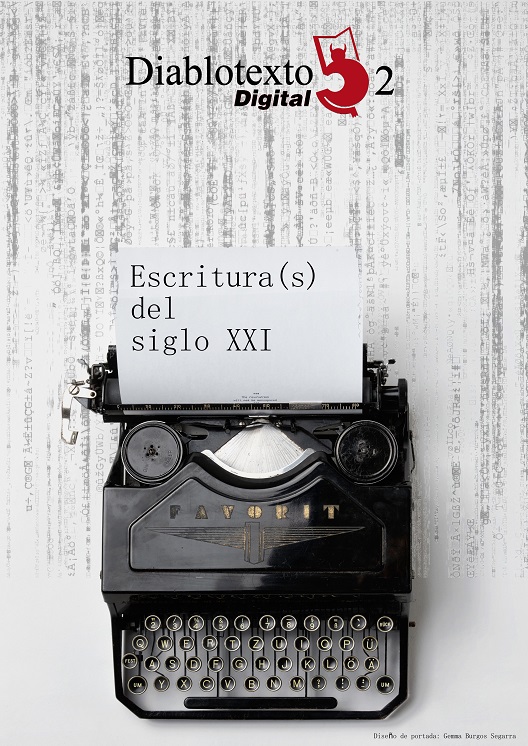Zenda, representación, cambio cultural, nuevos valores, crítica, blogs, escritores, mundo editorial, (más allá de la) posmodernidad
DOI:
https://doi.org/10.7203/diablotexto.2.10161Keywords:
Zenda, representation, cultural change, new values, critics, blogs, writers, publishing world, (beyond) postmodernity Abstract
Abstract
This paper aims to analyze the reception of Zenda: Autores, libros y cía. (on-line literary website founded in April 2016 by a group of Spanish writers) among the internet users, not in order to place it in relation to the cultural journalism, but rather to identify possible types of representation from a cultural change perspective. In this sense, we will apply recent Anglo-Saxon theories that point to the surpassing of postmodernity. Using the analysis of recent cultural and socioeconomic phenomena, the mechanisms of the publishing world and the survey made among the internet-users, we will identify three possible representations of Zenda: a postmodern one defined by heterogeneity and antielitism, the second one inspired by the positive and humanistic values of the new episteme that seeks to suppress the mediation in order to gain a closer access to things (authenticity, independence, accessibility, hospitality) and, finally, a representation based on the simulacra of these values, assimilated and denaturalized by the capitalism logic that is still reigning.
 Downloads
Downloads
 References
References
(s. a.) (2016). “Cómo es Zenda, el sitio web de actualidad literaria creado por escritores”, La Nación, 4 de abril de 2016, en http://www.lanacion.com.ar/1885878-escritores-iberoamericanos-crean-zenda-una-web-literaria-de-difusion-de-contenidos [Fecha de consulta: 30 de abril de 2017].
AGENCIA EFE (2016). “Pérez-Reverte, Marías y otros escritores crean la web literaria Zenda”, 3 de abril de 2016, en https://www.efe.com/efe/espana/cultura/perez-reverte-marias-y-otros-escritores-crean-la-web-literaria-zenda/10005-2885324 [Fecha de consulta: 30 de abril de 2017].
MAAD, Assma (2014). “Pourquoi le normal devient tendance?”. Madame. Le Figaro, 28 de marzo de 2014, en http://madame.lefigaro.fr/societe/pourquoi-normal-devient-tendance-280314-847096 [Fecha de consulta: 30 de abril de 2017].
BARTHES, Roland (1964). “Ecrivains et écrivants”. Essais critiques, Paris: Seuil.
CHASTELLIER, Ronan (2013). Tous en slip! Essai sur la frugalité contemporaine et le retour aux valeurs simples. Paris: Ed. Du Moment.
DE LA PEÑA, Pedro J. (1994). “Visión crítica de los suplementos literarios”, Comunicación y estudios universitarios, n.° 4, pp. 193-201.
FUNK, W. Gross, F., Huber, I. (2012). “Exploring the empty Plinth. The Aesthetics of Authenticity”. The Aesthetics of Authenticity: Medial Constructions of the Real. Bielefeld: Transcript-Verlag, Col. Cultural and Media Studies, pp. 9-21.
HUBER, Irmtraud (2014). Literature after Postmodernism. Reconstructive Fantasies. New York: Palgrave Macmillan.
KRMPOTIC, Milo J. (2011). “Internet, la crítica y la mujer de César”. Qué leer, septiembre 2011, p. 4.
MANRIQUE SABOGAL, Winston (2011). “Radiografía de la crítica literaria” (reportaje-entrevista colectiva), El País, 26 de noviembre de 2011, en https://elpais.com/diario/2011/11/26/babelia/1322269936_850215.html [Fecha de consulta: 30 de abril de 2017].
NOELIA (2016). “Zenda libros”, 6 de abril de 2016, en http://amitambienmegustaleerantesdeacostarme.blogspot.fr [Fecha de consulta: 30 de abril de 2017].
PÉREZ-REVERTE, Arturo (2016). “Veinte años después: La novia de d’Artagnan”, Zenda: Autores, libros y cía., 6 de abril de 2016, en https://www.zendalibros.com/veinte-anos-despues-la-novia-de-artagnan [Fecha de consulta: 30 de abril de 2017].
PÉREZ-REVERTE, Arturo, “Bienvenidos a Zenda”, Zenda: Autores, libros y cía., 1 de abril de 2016, en https://www.zendalibros.com/bienvenidos-a-zenda [Fecha de consulta: 30 de abril de 2017].
PHILIPS, Carli (2014). “Luxury fashion just got more personal”, The Australian, 21 de mayo, en http://www.theaustralian.com.au/life/fashion/luxury-fashion-just-got-more-personal/news-story/e04681e38d26be05bffe871d9f52b280 [Fecha de consulta: 30 de abril de 2017].
RODRÍGUEZ JIMÉNEZ, Antonio (2013). “El suplemento de cultura: Vehículo esencial en la crítica literaria contemporánea”, Ámbitos. Revista de ciencias sociales y humanidades, n.° 30, pp. 113-120.
SCHOPENHAUER, Arthur [1819] (2016). El mundo como voluntad y representación, Pilar Lopez de Santa María (trad.). Madrid: Trotta, Clásicos de la cultura.
VERMEULEN, T. y van den Akker, R. (2010). “Notes on Metamodernism”, Journal of aesthetics and culture, vol. 2, DOI: https://doi.org/10.3402/jac.v2i0.5677 [Fecha de consulta: 30 de abril de 2017].
WILCE, James M. y Fenigsen, Janina (2015). “De-essentializing authenticity: A semiotic approach”, Semiotica, 30 de enero de 2015, DOI: https://doi.org/10.1515/sem-2014-0071 [Fecha de consulta: 30 de abril de 2017].
TF1 (s.a.). “Les femmes naturelles: la beauté sans artifice”, Bachelor 2016, en https://www.tf1.fr/nt1/bachelor/videos/naturelles-misent-l-humour.html [Fecha de consulta: 30 de abril de 2017].
Downloads
Published
How to Cite
-
Abstract825
-
PDF (Español)452
Issue
Section
License
Licencia de reconocimiento de Creative Commons “Reconocimiento - No Comercia l- Sin Obra Derivada
Authors who publish with this journal agree to the following items:
The authors will keep their copyright and guarantee the journal the right of first publication of their work, which will be simultaneously subject to the Creative Commons license that allows third parties to share the work indicating its author and its first publication in the journal. The authors may adopt other non-exclusive license agreements to distribute the version of the published work (e.g., depositing it in an institutional telematic file or publishing it in a monographic volume), with an acknowledgment of its initial publication in this journal. The authors are allowed and encouraged to disseminate their work through the Internet (e.g., in institutional telematic archives or on their website) before and during the submission process, which can produce interesting exchanges and increase citations of the published work. (See Effect of Open Access)




